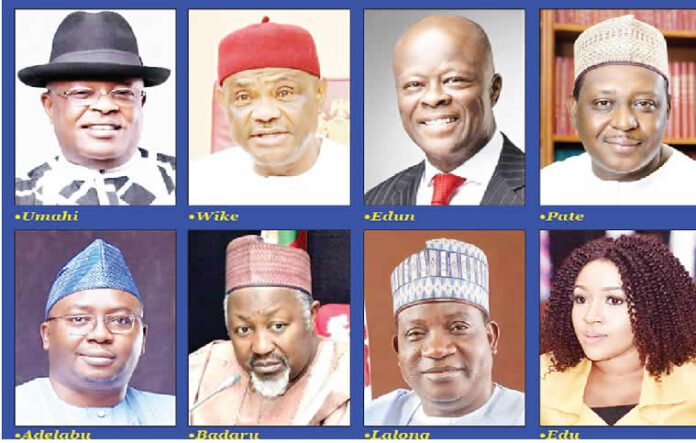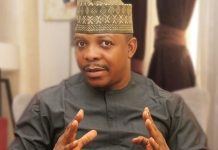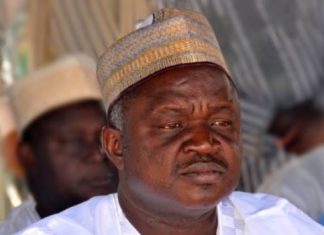The nation may have to pay the newly appointed ministers’ housing allowances at a yearly cost of roughly N343.25m.
The Federal Government would spend N1.37 billion on housing for the 45 ministers-designate over the course of four years using that annual allocation.
The allowances are calculated using information compiled from a document downloaded from the Revenue Mobilization and Fiscal Allocation Commission’s website.
It includes housing allowances (200% of the basic salary), domestic staff allowances (75% of the basic salary), utility allowances (30% of the basic salary), and furnishings allowances (300% of the basic salary).
Furniture allowance is often provided just once every four years, in contrast to other allowances paid on a monthly basis.
Recently, President Bola Tinubu revealed the ministers’ portfolios.
Nasir El-Rufai, a former national women’s leader of the All Progressives Congress, Stella Okotete, and Danladi Abubakar, a ministerial nominee from Taraba State, were not included in the list that our correspondent in Abuja acquired.
Due to security procedures, the Senate had already delayed the confirmation of the three.
13 of the nominees were named Ministers of State according to the list our reporter acquired, and several new ministries were also established.
The following list includes the ministers and their titles. Bosun Tijani is the Minister of Communications, Innovation, and Digital Economy. Ishak Salako is the Minister of State for the Environment and Ecological Management. Wale Edun is the Minister of Finance and Coordinating Minister of the Economy. Bunmi Tunji-Ojo is the Minister of Marine and Blue Economy. Adebayo Adelabu is the Minister of Power. Tunji Alausa is the Minister of State for Health and Social Welfare. Dele Alake is the Minister of Solid Minerals Development.
Doris Anite, Minister of Industry, Trade, and Investment; Uche Nnaji, Minister of Innovation, Science, and Technology; Nkiruka Onyejeocha, Minister of State for Labor and Employment; Uju Kennedy, Minister of Women’s Affairs; David Umahi, Minister of Works; Festus Keyamo, Minister of Aviation and Aerospace Development; Abubakar Momoh, Minister of Youth; Betta Edu; and Ekperikpe Ekp, Minister of State for
Hannatu Musawa, Minister of Arts, Culture, and the Creative Economy; Muhammad Badaru, Minister of Defense; Bello Matawalle, Minister of State for Defense; Tanko Sununu, Minister of State for Education; and Ahmed Dangiwa, Minister of Housing and Urban Development, are all included on the list.
With 48 nominees, Tinubu set a record for the most ministerial appointments in Nigeria’s Fourth Republic (1999 to the present), which experts said would make the expensive governance even more expensive.
The 42 people named by the President’s predecessor, Muhammadu Buhari, in 2019 were surpassed by five more nominations.
Tinubu first proposed 28 individuals for confirmation as ministers by the Senate. There are now 47 prospective cabinet members after the President received two additional lists of 19 names.
However, Tinubu retracted Maryam Shetty’s nomination as a ministerial nominee from Kano State and replaced her with Dr. Mariya Mahmoud Bunkure, who is also from Kano State. As a nomination for screening, he also listed Festus Keyamo, a Senior Advocate of Nigeria from Delta State.
Buhari appointed 36 ministers during his first term; during his second term, that number rose to 42.
There were 33 candidates for ministerial positions in the former president Goodluck Jonathan’s cabinet in 2011, including nine from the Umar Yar’Adua administration.
37 men and 7 women made up Yar’Adua’s 39-person cabinet in 2007.
Before leaving office in 2007, former President Olusegun Obasanjo reduced the number of ministries and ministers in his cabinet from the initial 42 to 27 and 40, respectively.
Despite promises to lower the expense of governance, Tinubu has already nominated 48 potential ministers, breaking the previous record set by Obasanjo, Yar’Adua, Jonathan, and Buhari 24 years ago.
However, with the three still awaiting approval, there are now just 45 ministers, which is still more than in past administrations.
Each minister is entitled to a housing allowance of N4.05 million, a domestic staff allowance of N1.52 million, a utilities allowance of N0.61 million, and a furniture allowance of N6.08 million, which is paid once every four years.
A housing allowance of N3.92 million, a domestic staff allowance of N1.47 million, a utilities allowance of N0.59, and a furniture allowance of N5.87 million, each payable once every four years, are all available to each minister of state.
According to a study of the data, each minister is anticipated to receive a yearly salary of N7.7 million, while each minister of state is anticipated to receive N7.45 million.
Each minister receives N30.8, while each minister of state receives N29.8, over the course of four years.
The 32 ministers will cost the nation roughly N985.6 million in total, while the 13 ministers of state would consume about N387.4 million over the course of four years.
This also implies that the 45 ministers would cost the nation N1.37 billion in total over the course of four years.
After the three pending ministerial nominations are approved, the number is anticipated to rise despite demands for the expense of government to be cut.
An economist, Prof. Akpakpan Edet, had claimed that the addition of more ministers was superfluous and would drive up the expense of government.
“What they did is dangerous,” he declared. We have been griping about the expense of government for a very long time. We assessed their institutional structure and recommended that the government scale back its operations. However, there were a ton of overlaps. It makes no sense to talk about 48 ministers right now.
The consequence is that they will raise the price of governance even more. We don’t need this many ministers at this stage of our democracy; you may combine the ministries and still carry out the duties. A more efficient but leaner government is what we need.
Deborah Oluwagbenga, an economist, added that Nigeria’s financial situation prevented it from hiring many ministers.
“Let’s not forget that this country has enormous debt, and the greatest course of action is to lower the cost of governing,” she said. The President is already setting the groundwork for governors to do the same if he is appointing this many aides.
“This is not conducive to progress and could destroy the nation’s economy. At this point, our focus should be on cutting costs and trying to maximize what we already have in areas that require improvement. We cannot carry on in this manner.
Join Television Nigerian Whatsapp Now
Join Television Nigerian Facebook Now
Join Television Nigerian Twitter Now
Join Television Nigerian YouTUbe Now





